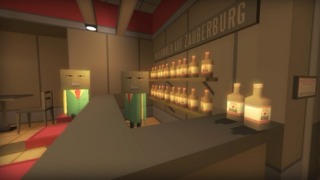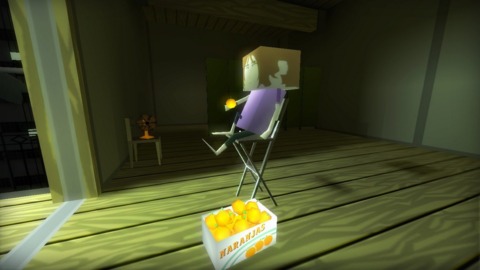Thirty Flights of Loving: One of the Least Reviewable Games of the Year
Thirty Flights of Loving exists wholly outside of the standards that are often used to define what makes a great game. That's part of why Carolyn Petit loves it.
Thirty Flights of Loving costs $4.99. You can pick up guns and ammo, but you don't shoot anything. Nor do you solve any puzzles. In fact, it doesn't require any skill whatsoever to complete, and it's entirely linear. The graphics, assessed technically, are laughable. And the game can be completed in under 15 minutes. Evaluated by traditional game evaluation standards, Thirty Flights of Loving sounds like a disaster. But it's one of the most surprising and memorable game experiences I've had this year.

The unexpected is exciting. Often, we play a level or two of a game, and we know basically how the whole game is going to play out. Narrative twists like the big reveal in BioShock, and gameplay surprises like the final boss battle in Ms. Splosion Man, are memorable in part because they're so unexpected. In Thirty Flights of Loving, you never get sure footing. From one moment to the next, you're constantly facing the unexpected. Thirty Flights tells one of the most confidently told stories I've ever encountered in a game. Here, less isn't just more. It's everything. The pleasure of Thirty Flights emerges from the things left unshown, the connections that aren't made clear. In those ambiguous spaces, your brain has room to play. To infer. To speculate. To imagine.
In a broad sense, the experience of playing Thirty Flights of Loving reminded me of seeing Tomas Alfredson's film Tinker Tailor Soldier Spy. With Tinker Tailor, I wasn't able to put all the narrative pieces together on my first viewing, and after discussing the movie with people who are way more astute about film than I am, I came away with the impression that this is true for most viewers. But this isn't a flaw. On the contrary, it's part of what makes the film so remarkable. It trusts viewers to be capable of being invested in the characters and the moment-to-moment emotions even when the plot details are murky. And shouldn't a story about people who compartmentalize every aspect of their lives, keeping secrets from their lovers and closest friends, be reticent about laying out the details of its intricate story? It's all there. You just need to pay attention.
The pleasure of Thirty Flights emerges from the things left unshown… In those ambiguous spaces, your brain has room to play. To infer. To speculate. To imagine.
It may seem strange to compare a lengthy film to a 15-minute video game, but in this regard, the two are quite similar. Like Tinker Tailor, Thirty Flights of Loving gives you information to help you piece the picture together, but you need to be observant to pick up on all of it. There are no lengthy voice-overs, no dossiers to unlock with gobs of superfluous background information. It is a lean, mean piece of storytelling, and the method in which it communicates its tale is so unlike what most games employ that while playing it, I was exhilarated to be experiencing something wholly new.
The most unusual and powerful tool Thirty Flights of Loving uses to tell its story is the smash cut. Thirty Flights of Loving is, on its surface, about a trio of criminals planning to perform a risky vault heist. But although the gameplay is entirely linear, the way in which the events surrounding the heist are presented is not. At one moment, you are at Cugat Airfield, the planned heist seemingly having gone horribly wrong. You're surrounded by men and women hustling and bustling on their way, making unknown connections that will carry them to unknown destinations, while out the window, planes constantly vanish, bound for who knows where.

It's an alienating, transitional place, home to no one. But as you push your wounded comrade Borges--the safecracker, forger, and pilot of the group--down a hallway in a wheelchair, the speed and frenzy suddenly give way to something else entirely. You climb out of bed. It's a warm city night, the temperature suggested by an oscillating fan. (In this visually minimalistic world, details have the opportunity to take on greater significance.) Here, your other partner, Anita--demolitionist, mechanic, and sharpshooter--is lackadaisically eating oranges and throwing the peels out onto the balcony. You can partake, if you wish, and share a silent moment with her.
It's committed to not imposing a clear narrative or an easily digestible meaning on itself. It respects you too much.
The cut is disorienting. What is this place? How is this connected to the events at the airfield? Thirty Flights of Loving never makes its connections explicit, as it jumps from the airfield to other places and times, and then back again. It's on you to put the pieces together. But doing so is a pleasure, because there are moments of beauty that catch you off guard, and because the momentum of the story is so propulsive, driving you ever onward to its inevitable conclusion. The effect, ultimately, is like that of being at a moment of tremendous gravity and consequence in one's life, while memories of choices made in the past that led you to this moment intrude on the present.
Wouldn't it be nice if you could just linger forever in that one perfect moment, that moment when you held love in your arms and freedom seemed to stretch before you endlessly?
Alas, time waits for no one.
Fittingly, Thirty Flights of Loving ends in an art gallery. In galleries, pieces of art are typically presented as open to interpretation, with no meaning imposed on them other than what you take away. Thirty Flights of Loving is much the same. It's committed to not imposing a clear narrative or an easily digestible meaning on itself. It respects you too much. That's what makes it so exciting to me, and if you approach it with an open mind and an open heart, I think you'll find it quite remarkable, too.
Got a news tip or want to contact us directly? Email news@gamespot.com
Join the conversation